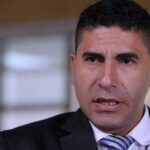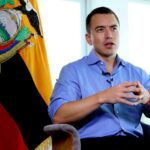
Thelma Cabrera, Guatemalan indigenous activist and presidential aspirant from the MLP party; Neftalí Matías López Miranda, indigenous scholar and political consultant; and their supporters arriving at the Plaza de la Constitución during the closing of the MLP's campaign. Photo: Simone Dalmasso.







